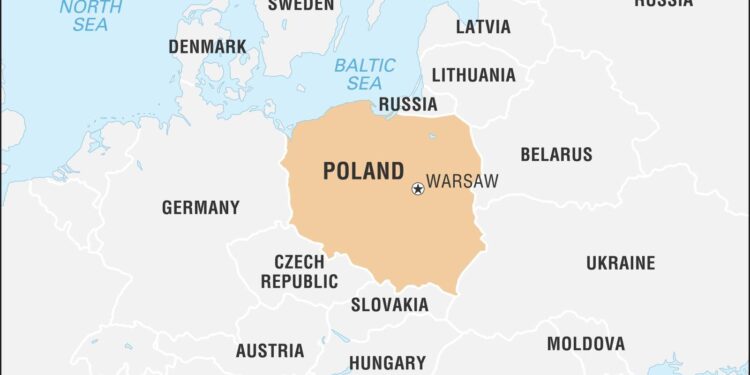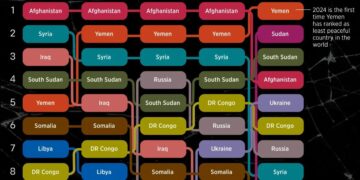Heightened Diplomatic Strains: Russia Shuts Polish Consulate in St. Petersburg
In a marked intensification of diplomatic discord, Russia has officially closed the Polish consulate located in St. Petersburg and ordered the expulsion of Polish diplomatic staff. This move reflects deepening tensions between Moscow and Warsaw amid ongoing geopolitical conflicts, particularly surrounding divergent perspectives on Ukraine and unresolved historical disputes. The closure not only signals worsening bilateral relations but also poses significant questions about future cooperation and stability within Eastern Europe.
Russia-Poland Relations Reach New Low with Consulate Shutdown
The recent shutdown of Poland’s consular mission in St. Petersburg represents a sharp downturn in Russian-Polish diplomacy. Russian officials justified their decision as a “reciprocal measure” responding to what they described as hostile actions by Poland, marking an escalation that disrupts established communication channels between the two countries.
| Event | Date | Consequences |
|---|---|---|
| Polish Consulate Closure in St. Petersburg | October 2023 | Deterioration of diplomatic ties |
| Expulsion of Polish Diplomats from Russia | October 2023 | Looming breakdown in dialogue mechanisms |
| Anticipated Response from Poland’s Government | TBD (Pending) | Potential retaliatory measures expected |
This development follows months of mutual recriminations fueled by contrasting narratives over Ukraine’s conflict and lingering historical animosities dating back to World War II and Cold War-era grievances. Poland’s firm alignment with Western sanctions against Russia has further strained relations, complicating efforts for dialogue or reconciliation.
Bilateral Fallout: Assessing the Broader Impact on Regional Cooperation and Security Dynamics
The expulsion of diplomats coupled with consular closures is symptomatic of an increasingly adversarial posture from Moscow toward Warsaw, which could have far-reaching consequences beyond immediate political fallout.
- Diminished Diplomatic Engagement: Reduced official presence limits opportunities for negotiation on critical issues such as energy security—especially given Europe’s ongoing efforts to diversify away from Russian gas—and cross-border trade facilitation.
- Erosion of Cultural Exchanges: Historically rich cultural interactions risk being curtailed, potentially undermining people-to-people connections that have helped temper political tensions over decades.
- Perturbations to Multilateral Frameworks: The rift may complicate cooperation within broader European institutions where both nations participate, including NATO dialogues focused on regional defense strategies amid rising military posturing along Eastern European borders.
- A Ripple Effect Across Diplomacy:The move might inspire similar reciprocal actions by other countries wary of escalating tensions with Russia or seeking leverage amid global geopolitical shifts—mirroring patterns seen recently elsewhere such as Taiwan’s academic exchange bans affecting mainland Chinese universities (February 2025).
The Risk of Escalation: Military Readiness and Retaliatory Measures
This diplomatic rupture raises concerns about potential militarization along shared borders or increased defense spending aimed at deterrence rather than de-escalation—a trend already visible across NATO member states bordering Russia since early 2024.
- If Poland responds by reducing its own embassy staff or expelling Russian diplomats, this tit-for-tat could spiral into deeper hostility affecting civilian populations through travel restrictions or economic sanctions.
- NATO allies may be compelled to reassess their strategic postures while balancing support for Poland without provoking further aggression from Moscow.
- The broader European security architecture faces challenges maintaining cohesion amidst these bilateral frictions that threaten collective stability.
- Cementing Alliances Within the EU & NATO: Strengthen coordination among European Union members alongside reinforcing commitments under NATO frameworks to ensure unified responses toward any aggressive maneuvers by Russia.
- Diversifying Energy Partnerships: Pursue accelerated partnerships beyond traditional suppliers—such as expanding LNG imports from Norway or Qatar—to reduce reliance on Russian energy sources vulnerable during geopolitical crises.
- Cultivating Regional Solidarity: Create stronger bonds with neighboring Eastern European states like Lithuania, Latvia, and Slovakia through joint security initiatives enhancing collective resilience.
- Energizing Public Diplomacy Efforts: Launch campaigns aimed at informing domestic audiences about evolving geopolitical realities while counteracting misinformation propagated via cyber channels linked to foreign actors.
- Investing Heavily In Cybersecurity And Defense Capabilities: Bolster digital infrastructure defenses against disinformation attacks alongside upgrading military readiness through procurement modernization programs aligned with NATO standards.&b >
A Forward-Looking Approach: Strategic Recommendations for Warsaw Amid Rising Tensions
Navigating this turbulent phase requires Warsaw to recalibrate its foreign policy toolkit carefully while safeguarding national interests against potential provocations from Moscow. Key strategic priorities should include:
An integrated crisis communication framework will be essential for managing public perception during any future escalations effectively — ensuring transparency without inflaming nationalist sentiments unnecessarily.
The Road Ahead: Navigating Uncertain Waters Between Two Neighbors
The closure of the Polish consulate in St Petersburg combined with diplomat expulsions marks a pivotal moment reflecting deteriorated trust between two historically intertwined neighbors now divided sharply over contemporary geopolitics. While immediate prospects appear bleak given entrenched positions regarding Ukraine conflict involvement and mutual accusations spanning decades-old grievances, there remains scope for cautious engagement facilitated by third-party mediation within international forums such as OSCE or UN platforms aiming at de-escalation strategies.
This episode serves as a stark reminder that regional peace hinges not only upon statecraft but also sustained people-to-people connections fostering understanding despite political upheavals — underscoring why preserving cultural exchanges even amidst crises is vital for long-term reconciliation prospects across Eastern Europe’s complex landscape.














